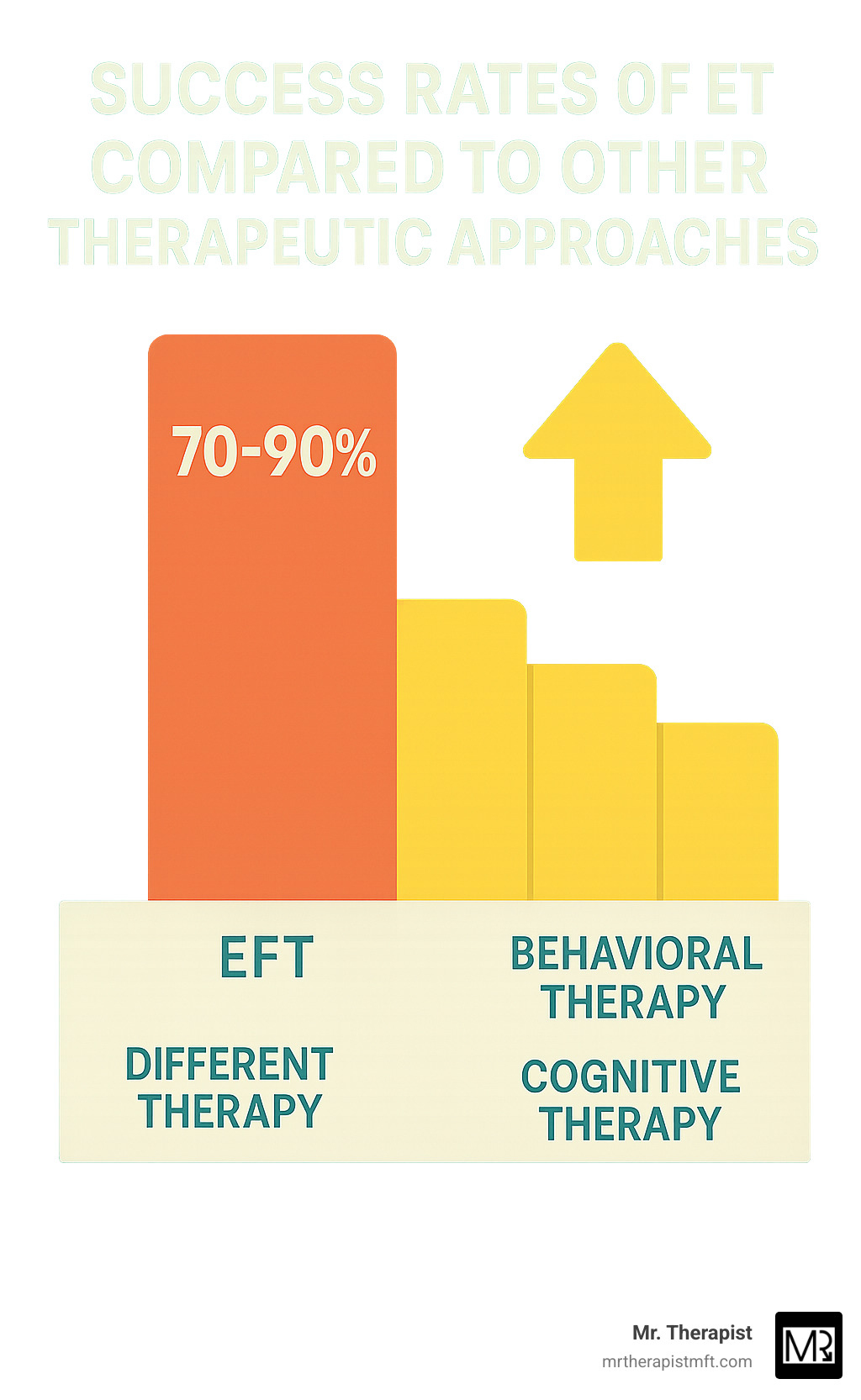
The Path to Becoming an Emotion Focused Therapist
Emotion focused therapy certification is a structured professional pathway for mental health providers who want to gain expertise in this evidence-based approach. Here’s what you need to know:
| EFT Certification Essentials | Details |
|---|---|
| Certifying Bodies | ICEEFT (International Centre for Excellence in EFT) and ISEFT (International Society for Emotion-Focused Therapy) |
| Basic Requirements | Licensed mental health professional (or student in mental health field) |
| Training Pathway | 1) 4-day Externship (30 hours) 2) Core Skills Training (4 two-day modules) 3) 8+ hours of supervision 4) Video submission and evaluation |
| Timeline | Typically 18-36 months for full certification |
| Cost Range | $2,000-$6,000 total (varies by region) |
Developed in the 1980s by pioneers like Dr. Leslie Greenberg and Dr. Sue Johnson, Emotion Focused Therapy (EFT) has evolved into one of the most well-researched and effective approaches for treating individuals, couples, and families. At its core, EFT is grounded in attachment theory and uses emotions as powerful agents of change rather than obstacles to overcome.
EFT is unique because it focuses on changing emotions with emotions. As the EFTI motto states: “With decades of empirical research and clinical experience, we are committed to helping people understand and use their emotions to get what they need in their relationships and life.”
The certification process ensures therapists develop three essential skill sets:
- Alliance Skills – Creating safety and attunement with clients
- Micro Skills – Using specific interventions like RISSSSC prosody (slow, soft, simple speech)
- Tango Skills – Following the 5-step EFT process for emotional change
Becoming certified typically begins with an intensive 4-day Externship followed by Core Skills training over approximately one year. This training involves both didactic learning and experiential components, including role-play, video review, and live demonstrations. After completing the required supervision hours, candidates submit video recordings of their work for evaluation by certified supervisors.
My name is Emmanuel Romero, a Licensed Marriage & Family Therapist with specialized training in emotion focused therapy certification who has helped individuals, couples, and families transform their relationships through this powerful approach at my private practice, Mr. Therapist Counseling Services.

Quick emotion focused therapy certification terms:
– emotion focused therapy techniques
– emotion focused therapy for anxiety
– emotion focused therapy worksheets
Emotion-Focused Therapy 101: Model, History & Science
When you walk into our office at Mr. Therapist, you’ll often hear us talk about emotions as the pathway to healing—not obstacles to overcome. This perspective comes directly from Emotion-Focused Therapy (EFT), a powerful approach developed in the 1980s by Dr. Leslie Greenberg and Dr. Sue Johnson. While Dr. Greenberg focused initially on individual therapy, Dr. Johnson expanded the model to transform how we work with couples.
I’ve seen how this approach changes lives. The core idea is beautifully simple yet profound: we use emotions to change emotions. As our colleagues at the Southern California Institute of Emotion Focused Therapy put it, “We have to feel a feeling in order to change it. We need to arrive at a place before we can leave it.”
What makes EFT so effective is its solid grounding in attachment science. We humans are wired for connection—it’s in our DNA. When those connections feel threatened, our emotions respond accordingly. EFT draws on neuroscience research about emotional regulation and brain plasticity, showing how secure attachment creates resilience and wellbeing in our lives.
The research backing EFT is impressive. Multiple peer-reviewed studies show that EFT creates lasting positive change for approximately 70-90% of couples, with improvements still evident years later in follow-up studies. This remarkable success rate has earned EFT recognition as one of the most empirically validated approaches to couples therapy available today.
Core Principles & Techniques
During emotion focused therapy certification, therapists learn several essential principles and techniques:
One key distinction we teach is between primary emotions (those core feelings like sadness, fear, and joy) and secondary emotions (reactive feelings like anger that often mask our vulnerability). Learning to identify and work with these different emotional layers transforms therapy.
The EFT Tango guides our therapeutic interventions through five essential steps:
– Reflect and track the cycle
– Assemble and deepen emotion
– Shape new interactions
– Process the interaction
– Integrate and validate
Creating safety is paramount in EFT. We develop strong alliance skills through what we call A.R.E.—Accessibility, Responsiveness, and Engagement—creating a space where clients feel truly seen and heard.

Chair work is one of our most powerful techniques. I remember when one of our therapists at Mr. Therapist shared: “When I first learned chair work during my certification, I was skeptical. But watching a client process ‘unfinished business’ with an imaginary person and witnessing their emotional breakthrough was transformative. That’s when I truly understood the power of this approach.”
We also master the RISSSSC prosody (pronounced “risks”)—a vocal approach using Reflective, Image-laden, Slow, Soft, Simple, Specific, and Clear speech to create emotional safety and deepen clients’ experiences. Learn more about the Emotion-Focused Therapy Approach that we use at Mr. Therapist.
Evidence Base & Success Rates
The evidence supporting EFT isn’t just good—it’s compelling. Multiple randomized controlled trials (the gold standard in research) consistently show its effectiveness across diverse populations and presenting problems.
The numbers speak for themselves: 70-90% recovery rate for couples in distress, typical treatment duration of just 8-20 sessions, and results that last—as shown in 2-year follow-up studies. Perhaps most importantly, EFT works effectively across diverse cultural backgrounds.

Dr. Sue Johnson’s work has received recognition from both the New York Times and Time magazine as the couples therapy with the strongest empirical support. What makes this particularly remarkable is that EFT achieves these results as a relatively brief intervention.
At our practice in San Clemente, California, we see these research findings validated every day. Clients who struggled for years in previous therapy often experience significant breakthroughs within just a few months of EFT treatment. The science behind this approach isn’t just academic—it translates into real healing for the people we serve.
You can find more information about the scientific research on EFT outcomes in the Journal of Current Opinion in Psychology, which highlights how emotion-focused approaches create lasting change.
Modalities of EFT: Individuals, Couples, Families
Did you know that Emotion Focused Therapy isn’t just for couples? While EFCT (the couples version) might be the most famous, the model has beautifully adapted to work with individuals and families too. At Mr. Therapist, we’ve seen how these different modalities can transform relationships of all kinds.

EFIT (Emotionally Focused Individual Therapy) helps people dive into their own emotional patterns and transform them from the inside out. As Dr. Sue Johnson beautifully puts it, “At the heart of all mental health problems are the client’s frightening emotions—helping clients make contact with distressing emotions in the right way is the key to creating profound, lasting healing.” In our practice, we’ve watched clients who’ve spent years avoiding certain feelings finally accept them and experience remarkable healing.
EFCT (Emotionally Focused Couples Therapy) remains the flagship application that most people recognize. The simple yet powerful motto “Hold me tight” captures everything this approach stands for. We help couples identify those frustrating negative cycles that keep them stuck and rebuild the secure attachment bonds that create lasting love. The look on partners’ faces when they truly feel seen by each other for the first time in years never gets old!
EFFT (Emotionally Focused Family Therapy) extends these principles across generations, helping family members develop more secure connections with each other. Family dynamics can be complicated, but the attachment needs underneath are universal. We’ve witnessed parents and teens who couldn’t be in the same room together develop genuine understanding through this process.
What makes our approach at Mr. Therapist special is that we’re trained in all three modalities. This means we can flexibly adapt based on what you and your loved ones need, rather than forcing you into a one-size-fits-all approach.
Key Differences Across Modalities
While the heart of emotion focused therapy certification teaches the same foundational principles across all formats, there are important differences in how we apply EFT depending on who’s in the room.
When working with individuals in EFIT, we focus on internal attachment patterns and self-regulation. Chair work becomes a powerful tool as clients dialogue with different parts of themselves. We place special emphasis on developing self-compassion, and typically see meaningful change in 8-20 sessions.
For couples in EFCT, we shine a spotlight on those negative cycles that keep partners stuck. Instead of chair work, we use enactments to restructure interactions right there in the therapy room. There’s a beautiful emphasis on helping partners express their deepest attachment needs and fears, often for the first time. Like individual work, couples typically need 8-20 sessions.
With families in EFFT, everything centers on parent-child attachment bonds. We gently process the parental blocks that might be hindering emotional connection, using a five-step emotion sequence to transform family dynamics. Family work tends to take a bit longer, usually 10-30 sessions, because of the additional relationships involved.
One of our clients shared something that perfectly captures the flexibility of EFT: “We started with couples therapy, but it became clear that our teenager was struggling too. Being able to transition to family therapy with the same EFT approach made a huge difference—we didn’t have to start over with a new therapist or model.”
The beauty of getting certified in all EFT modalities is that the skills transfer across contexts. Whether you’re sitting with an individual, a couple, or a whole family, you’re always working with the same attachment principles and emotion-focused strategies – just adapting them to fit the specific relationship dynamics in the room.
For more details about how we apply EFT with families at Mr. Therapist, visit our page on Emotionally Focused Family Therapy.
Emotion Focused Therapy Certification Roadmap
Ready to become an emotion focused therapy certification expert? The journey is both rewarding and structured, designed to build your skills step-by-step. Two main organizations oversee this process: the International Centre for Excellence in Emotionally Focused Therapy (ICEEFT), founded by Dr. Sue Johnson, and the International Society for Emotion-Focused Therapy (ISEFT), which follows Dr. Leslie Greenberg’s approach.
Your certification pathway will typically include five key milestones:
- An intensive 4-day Externship (28-30 hours) to lay the foundation
- Core Skills Training spread across four 2-day workshops over about a year
- 8-16 hours of supervision with a certified EFT supervisor
- Recording and submitting therapy sessions for expert evaluation
- A thorough competency review by certified assessors
It’s encouraging to know that as of 2024, ICEEFT has grown to include over 8,000 members across more than 40 countries, with 90+ regional communities worldwide. This global presence means you can likely find training opportunities no matter where you practice.
Minimum Requirements for emotion focused therapy certification
Before jumping in, make sure you meet these basic prerequisites:
You’ll need to be a licensed mental health professional (like a psychologist, social worker, marriage and family therapist, or professional counselor) or currently studying in a mental health field. Your professional record should be in good standing with your licensing board—ethics matter in this work!
The initial training requirement is completion of an 8-day workshop led by approved trainers. With ICEEFT, this means a 4-day Externship (30 hours), while ISEFT requires at least 8 days of basic training.
If your background isn’t in humanistic-experiential therapy (perhaps you’re coming from a CBT orientation), you might need an additional empathy-focused module to help bridge the gap.
Here at Mr. Therapist, we often suggest that therapists new to EFT start with a one-day Fundamentals workshop before committing to the full Externship. This gives you a taste of the model to see if it resonates with your therapeutic style.
For the complete details on ISEFT’s training requirements, check out their Training Standards for EFT for Couples Therapy page.
Levels & Titles Explained (Externship → Core Skills → Supervisor)
The emotion focused therapy certification journey has distinct levels, each representing growth in your expertise:
At Level A (Basic EFT Training), you’ll complete an 8-day workshop and receive your first supervisory experience (either 3 days in a group or 5 hours individually). You’ll be recognized as an EFT Trainee—your first official step into the EFT community!
Moving to Level B (Supervised Practice), you’ll engage in at least 16 hours of direct personal supervision while reviewing recordings of your sessions with at least two clients. During this phase, you’ll likely conduct around 60 client sessions using the EFT approach and be known as an EFT Therapist in Supervised Practice.
Reaching Level C (Certified EFT Therapist) involves submitting two video recordings of your work with different clients, along with brief case formulations. Your work will be evaluated by a certified supervisor, and upon approval, you’ll earn the title of Certified EFT Therapist.
For those wanting to go further, Level D (Certified Supervisor) requires extensive experience as a Certified EFT Therapist plus additional supervisor training. At the highest tier, Level E (Certified Trainer) involves experience as a Supervisor, attendance at trainer workshops, and board recommendation.
The ICEEFT pathway follows a similar progression but with slight differences: Externship → Core Skills → Certified Therapist → Certified Supervisor → Certified Trainer.
Step-by-Step Process to emotion focused therapy certification
Let’s break down this journey into manageable steps:
First, enroll in an Externship—a 4-day intensive workshop that builds your EFT foundation through theory, live observations, video demonstrations, and experiential exercises. It’s like learning to speak a new language of emotion and attachment.
Next, complete Core Skills Training through four 2-day workshops spread over about a year. These intimate groups (usually 12-16 participants) provide personalized attention as you present your own recorded sessions and receive valuable feedback.
Then, engage in supervision with a Certified EFT Supervisor for at least 8 hours (ICEEFT) or 16 hours (ISEFT). This can be done individually or in small groups, and it’s where your skills really begin to shine.
As you progress, record client sessions (with appropriate consent, of course) with at least two different clients. These recordings will be crucial for both supervision and your certification submission.
When you’re ready, submit your application package including two video recordings, a case formulation, and all required forms for review by certified supervisors.
After submission, you’ll receive evaluation and feedback based on specific competency criteria, highlighting both your strengths and areas for continued growth.
Finally, achieve certification and be recognized as a Certified EFT Therapist with a listing in the therapist directory—a professional milestone worth celebrating!
Many of our therapists at Mr. Therapist have found that connecting with peers during training provides invaluable support and practice opportunities. For more details on the specific interventions you’ll master, visit our page on Emotionally Focused Therapy Interventions.
Supervision & Competencies Checklist
Supervision is the heart of the emotion focused therapy certification process. During these valuable sessions, you’ll develop three essential skill sets:
Alliance Skills form the foundation of effective EFT work. You’ll learn attunement and empathic tracking—how to really be with clients in their emotional experience. You’ll practice creating a safe-haven therapeutic alliance where clients feel secure enough to explore vulnerable feelings. This includes engaging clients in their diversity and focusing on their underlying attachment needs and strategies.
Micro Skills are the moment-to-moment tools you’ll use. These include reflecting and validating client experiences, asking evocative open-ended questions that deepen emotional awareness, and making empathic conjectures that help clients access primary emotions. You’ll also master RISSSSC prosody (using slow, soft, simple speech patterns) and reframing problems in attachment terms.
Tango Skills represent the choreography of EFT sessions. You’ll become adept at identifying relational patterns and affect cycles, assembling and distilling emotions to their core, setting up and processing enactments between partners or family members, and summarizing progress while integrating gains.
For Level 3 certification (ISEFT) or the initial supervisory experience (ICEEFT), you’ll need either three days of group supervision with at least one client presentation or five hours of individual supervision covering at least two clients.
Your supervisor will use a comprehensive evaluation form to assess your competence across areas like empathy, marker identification, emotional deepening, and case formulation. Many training programs provide a downloadable checklist so you can track your progress toward certification—a helpful tool for staying organized on your journey.
Practical Considerations: Duration, Cost, Delivery Options
Getting your emotion focused therapy certification is a journey that requires some planning. Let’s talk about what you can expect in terms of time, money, and how you’ll actually complete your training.
Most therapists complete their certification in about 18-36 months. This timeline includes your 4-day Externship (30 hours of intensive learning), Core Skills Training (8 days typically spread over a year), supervision (8-16 hours which can happen alongside your Core Skills), and finally the video submission and evaluation process, which usually takes 2-3 months.
As for the investment, the total cost typically ranges from $2,000 to $6,000 depending on where you train and the format you choose. The Externship usually costs $700-$950, Core Skills around $1,200-$2,400, supervision between $100-$200 per hour (though group rates can be more affordable), and the certification application itself runs $200-$350.

At Mr. Therapist, we’ve seen how the training landscape has evolved in recent years. While in-person training offers valuable face-to-face connection, online options have made certification much more accessible, especially for therapists in areas without local training centers. The pandemic actually pushed forward the development of excellent virtual programs that still maintain the hands-on, experiential learning that’s so essential to EFT.
One of our therapists shared her experience: “I was really unsure about doing Core Skills training online, but the breakout rooms for practice sessions and the ability to watch recorded therapy actually improved my learning experience. And honestly, I saved thousands on travel expenses that I would have spent flying to training centers.”
Online & International Programs
The global reach of EFT has grown tremendously thanks to online training options. If you’re looking for virtual pathways, here are some excellent providers:
Psychwire with Dr. Sue Johnson offers comprehensive online courses that count toward your certification requirements. These are beautifully produced and include direct teaching from Dr. Johnson herself.
ICEEFT Virtual Training provides officially recognized externships and core skills training in virtual format, with the same rigorous standards as their in-person offerings.
Regional Centers around the world now commonly offer hybrid models that combine some in-person elements with online components for maximum flexibility.
For international therapists, it’s worth considering time zone differences when selecting online programs. Many training centers now offer asynchronous components so you can participate no matter where you’re located.
The good news is that continuing education credits are typically available for all official EFT training, though specific accreditation varies depending on your region and licensing board. Here at Mr. Therapist in California, we’ve found that all major EFT trainings are readily accepted by the California Board of Behavioral Sciences for CE credits.
Comparing EFT certification vs Other Credentials
| Aspect | EFT Certification | EMDR Certification | CBT Certification |
|---|---|---|---|
| Hours Required | 30-hour Externship + 8 days Core Skills + 8-16 hours supervision | 40-50 hours training + 10 hours consultation | Varies widely by certifying body (20-100 hours) |
| Competency Evaluation | Video submission and case formulation | Case consultation | Typically exam-based |
| Focus of Model | Attachment-based emotional processing | Trauma processing | Cognitive restructuring |
| Directory Benefits | ICEEFT/ISEFT therapist finder | EMDRIA directory | Varies by organization |
| Renewal | Continuing education every 2 years | Continuing education every 2 years | Typically every 1-2 years |
What makes EFT certification stand out from other therapy credentials is its emphasis on demonstrated clinical skill rather than just knowledge. The video submission requirement ensures you can effectively implement the model with real clients—it’s not just about knowing the theory, but showing you can apply it effectively in the therapy room.
Benefits & Maintenance of Your Credential
Earning your emotion focused therapy certification opens doors to a world of professional growth and client connection. Beyond the letters after your name, this credential brings tangible benefits that transform both your practice and your therapeutic effectiveness.
“The day I received my certification was when my professional identity truly crystallized,” shares one of our therapists at Mr. Therapist. “Suddenly, I wasn’t just a therapist – I was a specialist with a clear framework for helping people heal their deepest relationship wounds.”
Your certification immediately establishes professional credibility in a crowded therapeutic marketplace. As ICEEFT beautifully puts it: “Before you ever get certified, you’ll notice feeling better about your work, having more clarity, keeping your clients longer, having fewer drop-outs, having better outcomes and having more referrals.” This has certainly been our experience at Mr. Therapist, where our EFT-certified clinicians consistently report higher client satisfaction.
The referral network benefit is substantial. Being listed in the ICEEFT or ISEFT therapist directory connects you with clients specifically seeking EFT – people who already understand the value of emotion-focused work and are committed to the process. Many of our most motivated clients at Mr. Therapist first found us through these directories.
Perhaps most valuable is the community you join. Certification welcomes you into a global family of like-minded professionals passionate about attachment science and emotional healing. With ICEEFT spanning over 40 countries, more than 8,000 members, and 90+ regional communities, you’ll never lack for collegial support or professional development opportunities.
Staying current with research updates becomes effortless as a certified therapist. You’ll receive regular communications about the latest studies, refinements to the model, and emerging applications – keeping your practice evidence-based and cutting-edge.
Maintaining your hard-earned credential is straightforward:
– Complete approximately 12 hours of EFT-focused continuing education every two years
– Keep your professional license in good standing
– Adhere to ethical standards of practice
At Mr. Therapist, we encourage going beyond these minimum requirements. Many of our clinicians participate in monthly EFT consultation groups where they can present challenging cases and receive supportive feedback. We also regularly attend advanced workshops to deepen our expertise. For those interested in expanding their knowledge base, we’ve compiled recommendations on Emotionally Focused Therapy Books that have been particularly valuable to our practice.
Career Growth & Client Outcomes
The investment in emotion focused therapy certification continues paying dividends throughout your career, both in your professional development and in the lives of your clients.
One immediate benefit many therapists notice is higher client retention. The structured approach and deep emotional engagement of EFT typically creates stronger therapeutic alliances. Clients sense when a therapist truly “gets” them at an emotional level, and this connection keeps them engaged even through challenging therapeutic work.
Certification opens doors to specialized workshop opportunities that can further distinguish your practice. Once certified, you can pursue advanced training in targeted applications like EFT for trauma, EFT for addiction, addressing sexual issues through EFT, or culturally-adapted approaches.
Many therapists find that certification allows them to develop niche population expertise that’s both professionally fulfilling and practically beneficial for practice building. At Mr. Therapist, our certified therapists have developed specializations working with military couples, LGBTQ+ relationships, neurodivergent individuals, and multicultural families.
“Since completing my certification,” shares one of our therapists, “I’ve developed a specialty working with couples where one partner has ADHD. The EFT framework helps these couples understand how executive function challenges impact their attachment needs and emotional responses. It’s been incredibly rewarding to help these couples break free from blame and build more secure connections.”
The ripple effects of your certification extend far beyond your office. Each couple that finds healing through your work takes that secure attachment into their families, workplaces, and communities – creating a more emotionally connected world, one relationship at a time.
Frequently Asked Questions about emotion focused therapy certification
How long does full certification take?
Most therapists complete their emotion focused therapy certification journey in about 18-36 months. This timeline includes all the essential components: the initial 4-day Externship (30 hours), Core Skills Training (8 days spread over a year), supervision (8-16 hours), and finally the video submission and evaluation process which typically takes 2-3 months.
Your personal timeline might vary depending on your schedule, access to training opportunities, and how quickly you can work with suitable clients for your recorded sessions. Some motivated therapists with ready access to supervision and appropriate clients can complete the process more quickly.
We’ve noticed at Mr. Therapist that there’s real value in not rushing the process. Allowing time between training modules helps you integrate what you’re learning into your clinical practice and develop a deeper understanding of the EFT approach. As one of our therapists shared, “The space between trainings was where my real growth happened—I could try new interventions with clients and bring my questions to the next module.”
Can I count tele-health sessions toward video submissions?
Yes! Tele-health sessions are absolutely acceptable for both supervision and final video submissions for your emotion focused therapy certification. This policy became official during the pandemic and has remained in place as virtual therapy has become a standard practice option.
There are a few important guidelines to keep in mind:
– Your video should have sufficient quality to clearly show facial expressions
– Both you and your client(s) must be visible in the frame
– You need proper informed consent specifically for recording
– Always use a HIPAA-compliant platform for your sessions
Many therapists at Mr. Therapist have found that tele-health recordings actually offer some advantages for supervision purposes. The close-up view often captures subtle facial expressions and emotional shifts more clearly than traditional in-office recordings. One of our recently certified therapists noted, “My supervisor could spot micro-expressions in my tele-health sessions that might have been missed in an office recording—it actually improved the feedback I received.”
Do I need a specific degree before starting?
You don’t need a particular degree to pursue emotion focused therapy certification, but you do need to fall into one of these categories:
- A licensed mental health professional (such as a psychologist, social worker, marriage and family therapist, professional counselor, or psychiatrist)
- A student currently enrolled in a graduate mental health program
- A professional working under appropriate supervision from a licensed mental health provider
Life coaches can participate in EFT training only if they also meet professional mental health criteria—the model requires clinical training as its foundation.
At Mr. Therapist, our certified EFT therapists come from diverse educational backgrounds—from MSWs to PhDs in Psychology. We’ve found that academic credentials matter less than personal qualities like emotional openness, comfort with vulnerability, and a genuine interest in attachment-based approaches. As our founder Manny Romero often says, “The best EFT therapists aren’t necessarily the ones with the most degrees on their wall, but those who are willing to be emotionally present with their clients.”
Conclusion
Starting on the journey toward emotion focused therapy certification is a significant professional commitment that yields powerful rewards. As we’ve seen throughout this guide, the structured pathway—from Externship to Core Skills to Supervision to Certification—ensures that therapists develop both theoretical understanding and practical competence in this transformative approach.
At Mr. Therapist in San Clemente, California, we’ve witnessed how EFT certification deepens our ability to help clients steer emotional distress and build secure, resilient relationships. The skills you’ll develop extend far beyond the specific EFT model, enriching all aspects of your therapeutic work through deeper emotional attunement and attachment awareness.
One of our certified therapists recently shared with me: “Learning to work with emotions rather than against them completely transformed my practice. Clients who had been stuck for years in other therapy approaches often experience profound breakthroughs within just a few months of starting EFT.”
If you’re considering pursuing certification, I encourage you to take that first step by registering for an Externship or introductory workshop. You’ll find the community of EFT practitioners welcoming and supportive, united by a shared commitment to helping clients heal through emotional connection.
For those in Southern California, our team at Mr. Therapist includes several certified EFT therapists who work with individuals, couples, and families. We’re passionate about this approach because we’ve seen its life-changing impact, session after session, relationship after relationship.
To learn more about how we integrate EFT into our therapeutic work or to schedule a consultation, visit our services page.

As Dr. Sue Johnson often reminds us, “We know that love makes us vulnerable, but also that we are never as safe and strong as when we are sure we are loved.” Through emotion focused therapy certification, you’ll gain the skills to help clients transform vulnerability into connection and distress into security—truly changing emotion with emotion. And isn’t that why most of us became therapists in the first place?



